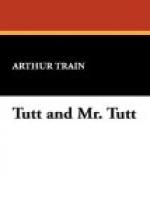“I say, chief,” disgustedly declared O’Brien to Peckham at the noon recess as they clinked glasses over the bar at Pont’s, “you’ve handed me a ripe, juicy Messina all right! I won’t be able to get a jury. We’ve been at it since ten o’clock and we haven’t lured a single sucker into the box!”
“What’s the matter?” inquired the D.A. apprehensively.
“I can’t quite make out,” answered O’Brien. “But most of ’em seem to have a sort of idea that to kill a Chinaman ain’t a crime but a virtue!”
“Well, don’t tell anybody,” whispered Peckham, “but I’m somewhat of that way of thinking myself. Set ’em up again, John!”
However, by invoking the utmost celerity a jury was at last selected and sworn at the end of the nineteenth day of the trial. As a jury O’Brien confidentially admitted to Peckham it wasn’t much! But what could you expect of a bunch who were willing to swear that they hadn’t any prejudice against a Chink and would as soon acquit him as a white man? The truth was that they were all gentlemen who, having lost their jobs, were willing to swear to anything that would bring them in two dollars a day. The more days the better! And it is historic fact that during the sixty-nine days of Mock Hen’s prosecution not one of them protested at being kept away from his wife and children, his business or his pleasure. On the contrary they all slumbered peacefully from ten until four—and when the trial ended, on the whole they rather regretted that it was over, the only genuine opinion regarding the case being that the Chinks were all as funny as hell and that Mr. Tutt was a bully old boy.
The evidence respecting the death of the unfortunate Quong Lee made little impression upon them. Seemingly they regarded the story much as they did that of Elisha and the bears or Bel and the dragon—as a sort of apocryphal narrative which they were required to listen to, but in no wise bound to believe. They were much interested in Quong’s suit of chain mail, however, and from time to time awoke to enjoy the various verbal encounters between the judge and Mr. Tutt. As factors in the proceedings they did not count, except to receive their two dollars per diem, board, lodging and hack fare.
The trial of Mock Hen being conducted in a foreign language, the first judicial step was the swearing of an interpreter. The On Gees had promptly produced one, whom O’Brien told the court was a very learned man; a graduate of the Imperial University at Peking, and a Son of the Sacred Dragon. Be that as it may, he was not prepossessing in his appearance and Mr. Tutt assured Judge Bender that far from being what the district attorney pretended, the man was a well-known gambler, who made his living largely by blackmail. He might be a son of a dragon or he might not; anyway he was a son of Belial. An interpreter was the conduit through which all the evidence must pass. If the official were biased or corrupt the testimony would be distorted, colored or suppressed.




